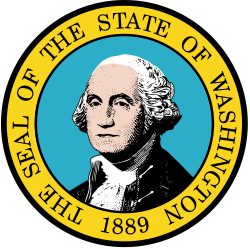Campaign
Republican challengers to incumbent Governor Rosellini began announcing their bids for the office in early 1960. State representative and Republican house minority leader Newman H. Clark of the 43rd district announced his bid on January 23 at a Republican Party committee meeting. [2] State Superintendent of Public Instruction Lloyd J. Andrews announced his bid on March 1, promising to improve the fiscal outlook for Washington's public schools while also criticizing Rosellini for his heavy spending and creation of a large tax burden. [3] Republican chairman William C. Goodloe was a favorite to run, [4] but announced in May that he would not run in the election. [5]
Rosellini announced his re-election bid on May 21, at a Democratic rally in Seattle's Civic Auditorium. Touting his accomplishments during his term in office, Rosellini promised to "continue the job of progress in the State of Washington." [6] Two Democratic candidates, Snohomish writer John Patric and Tacoma used cars salesman Bruce M. Sigman, both entered the race in July to challenge Rosellini, but did not make much headway. [7]
The Republican primary campaign, pitting Andrews and Clark, was described as "rigorous contest" between the two. Andrews centered his campaign on attacking Rosellini and his administration, while Clark criticized both Rosellini and Andrews for their fiscal positions and proposed tax hikes. [8] Early polls put Andrews as the clear frontrunner in the Republican race, with strong support from his native Eastern Washington, [9] leading Rosellini's campaign to begin attacking Andrews and his record in the state senate, sensing a close general election. [8]
During the September 13 primary, Rosellini defeated Patric and Sigman with a landslide victory, while Andrews defeated Clark by a comfortable margin. High voter turnout for Andrews, and low turnout for Rosellini, led The Seattle Times to declare that Rosellini "faces trouble" in the general contest. [10]
Two smaller parties, the Socialist Labor Party of America and Socialist Workers Party, also nominated candidates in the general election. [11]



